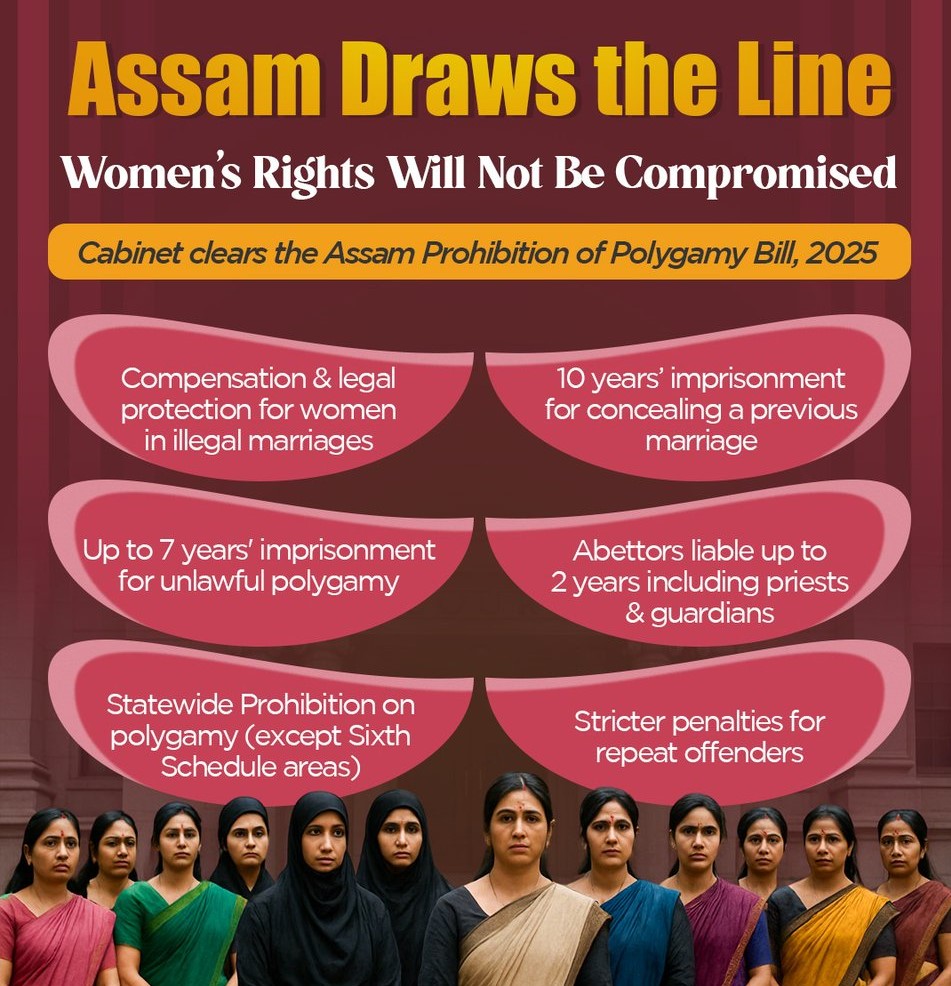Context:
Recently, The Assam Assembly passed the Assam Prohibition of Polygamy Bill, 2025, aimed at penalising individuals who enter into a second marriage without legally dissolving the first.
Key Provisions of the Bill:
1. Definition of Polygamy
o The Bill defines polygamy as contracting a marriage while a previous marriage is still subsisting (i.e., the spouse is not divorced, annulled, or legally separated).
o It also covers concealed existing marriages - if someone hides their prior marriage when contracting a new one, that becomes an aggravated offence.
2. Punishment
o First offence: Up to 7 years of imprisonment, and a fine. If the person concealed a prior marriage: Up to 10 years imprisonment.
o Repeat offences: The Bill proposes “double the punishment” compared to the previous conviction.

3. Penalties for Facilitators
o Persons who solemnise illegal marriages (priests, qazis): Up to 2 years imprisonment or a fine (up to ₹1.5 lakh).
o Guardians, parents, village heads, quazis who conceal or abet: Up to 2 years jail, plus fine up to ₹1 lakh.
4. Civic Disqualification
o Those convicted will be disqualified from public employment (state‑aided), state government schemes, and from contesting in Panchayat / Municipal / Local Body elections.
5. Extra‑Territorial Application
o Even if a person resident of Assam marries outside the state, the Bill proposes to apply, if that marriage violates the law.
Exemptions and Scope:
-
- The Bill will not apply to members of Scheduled Tribes (ST) as defined under Article 342 of the Indian Constitution.
- It also exempts areas under the Sixth Schedule of the Constitution, including autonomous regions like the Bodoland Territorial Region, Karbi Anglong, and Dima Hasao.
- The Bill will not apply to members of Scheduled Tribes (ST) as defined under Article 342 of the Indian Constitution.
About Polygamy:
· Polygamy is the practice of having more than one spouse at the same time, with the most common forms being polygyny (a man with multiple wives) and polyandry (a woman with multiple husbands). It also includes group marriage, where multiple men and women are married to each other.
Implications of the Bill:
-
- If passed, Assam would become one of the first states to criminalise polygamy explicitly (beyond existing bigamy provisions under general law), setting a precedent for state-level personal law reform.
- The Bill could empower women by giving them legal remedies (prison terms for offenders + financial compensation) — potentially reducing exploitation in informal or unregistered marriages.
- Politically, the Bill may deepen debates around personal law reform, secularism, and the role of state intervention in marriage practices.
- If passed, Assam would become one of the first states to criminalise polygamy explicitly (beyond existing bigamy provisions under general law), setting a precedent for state-level personal law reform.






